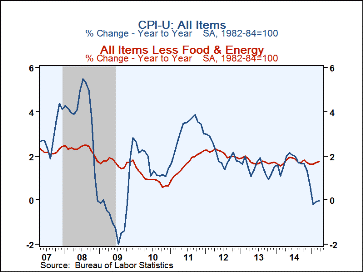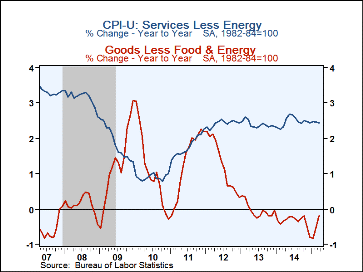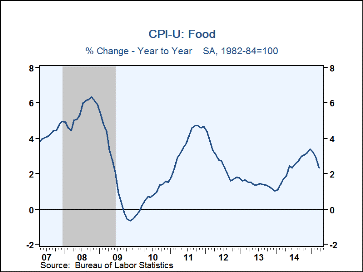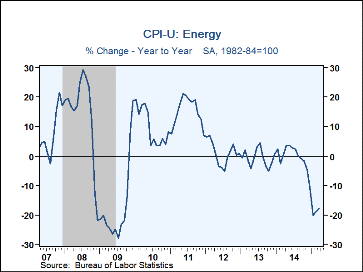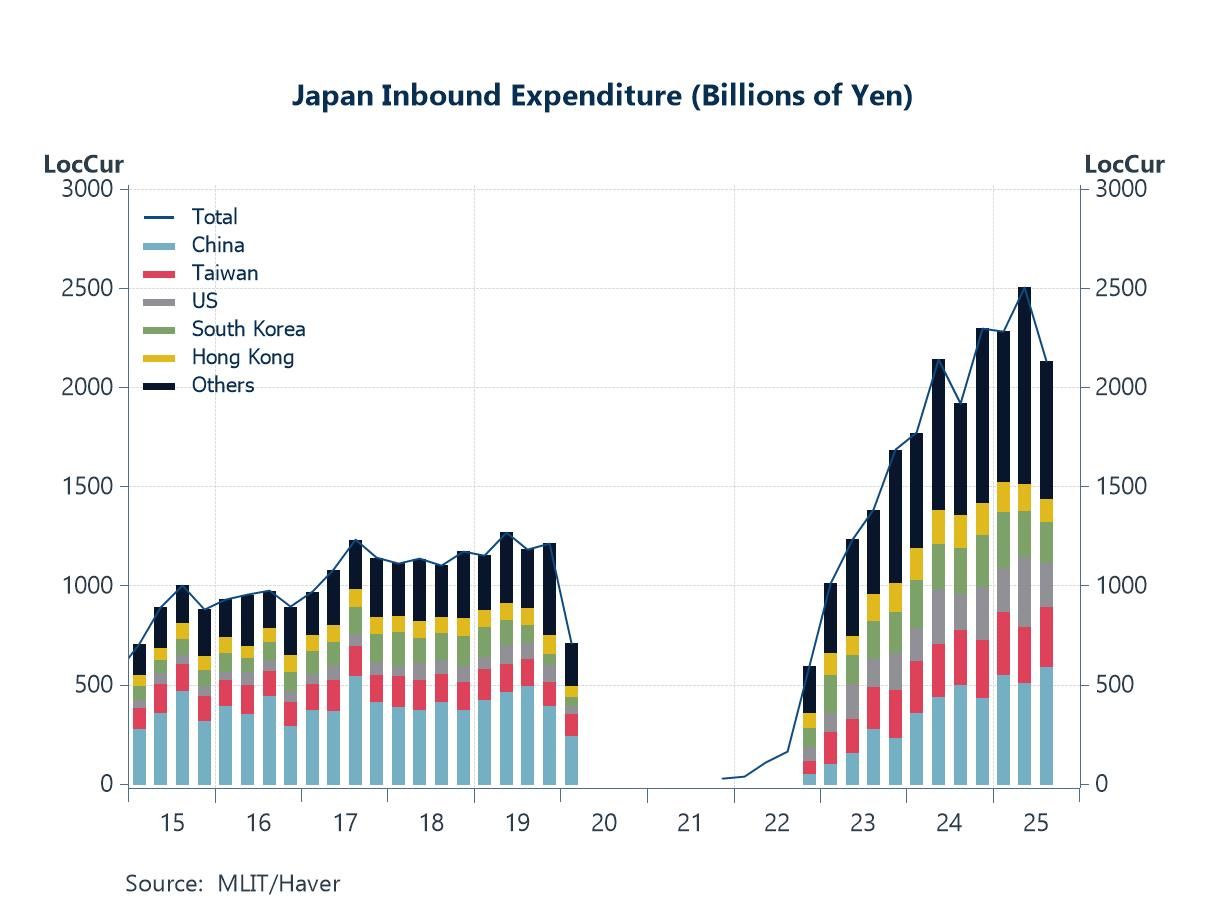 Global| Apr 17 2015
Global| Apr 17 2015U.S. Consumer Price Inflation Heats Up
by:Tom Moeller
|in:Economy in Brief
Summary
Prices recently gained upward momentum. The consumer price index increased 0.2% (-0.1% y/y) in March and February following declines in the prior three months. Last month's rise matched expectations in the Action Economics Forecast [...]
Prices recently gained upward momentum. The consumer price index increased 0.2% (-0.1% y/y) in March and February following declines in the prior three months. Last month's rise matched expectations in the Action Economics Forecast Survey. A 0.2% increase in the core price index, however, exceeded the average forecast for 0.1% improvement. It lifted the three-month rise to 2.3%, roughly double the growth during the last nine months.
Prices for goods excluding food & energy gained 0.3% (-0.2% y/y). The rise improved on February's 0.2% increase and spread broadly amongst categories. Apparel prices increased 0.5% (-0.5% y/y), up for the third straight month. It was led by a 0.7% rise (1.1% y/y) in men's clothing prices which followed a 3.1% surge. Women's apparel prices rose 0.7% (-2.6% y/y) and reversed February's decline. Used vehicle prices jumped 1.2% (-1.3% y/y), about as they did in February, and new vehicle prices gained 0.2% for the second month (0.8% y/y). That modest rise, however, followed five months of little change. Furniture & appliance prices gained 0.1% (-1.6% y/y), the first increase in five months. Recreation goods prices were little-changed (-2.8% y/y) after four months of decline. Medical care goods price inflation eased to 0.1%, but prices still rose a heady 4.2% y/y. Education & communications goods prices remained weak, posting a 0.4% decline (-4.2% y/y).
Core service price inflation remained under control, the 0.2% increase (2.4% y/y) was steady with gains during the last six months. To the upside, shelter prices gained 0.3% (3.0% y/y). Three-month growth rose to 3.2%, its strongest rise since May. Owners' equivalent rents of primary residence increased 0.3% (2.7% y/y). The 3.0% annualized gain during the last three months was the quickest since early-2008. Rents of primary residences also increased 0.3% (3.5% y/y). Tuition costs remained firm and jumped 0.5% (3.5% y/y). Medical care services prices gained 0.4% (1.9% y/y), but that followed an aberrant 0.4% decline. Remaining under control were recreation services prices as they ticked 0.1% higher for the second straight month (1.6% y/y). Public transportation prices declined 1.2% (-3.3% y/y).
Energy prices increased 1.1% (-18.3% y/y), strong for a second straight month. Gasoline prices improved 3.8% (-29.2% y/y) following a 2.5% rise. Fuel oil prices gained 5.9% (-24.9% y/y) after a 1.9% increase. To the downside, electricity costs fell 1.1% (+0.9% y/y) and natural gas prices declined 2.7% (-14.4% y/y).
Food prices eased 0.2% (+2.3% y/y) and reversed February's gain. Fruit & vegetable costs fell 1.4% (-1.1% y/y). Meat prices declined 0.9% (+8.3% y/y) and nonalcoholic beverage prices were off 0.6% (+1.2% y/y). Egg prices fell 0.5% (+5.3% y/y) and dairy prices declined 0.5% (+0.6% y/y) as well. Rising were cereal & bakery product prices by 0.4% (1.2% y/y) and poultry prices ticked 0.1% higher (2.1% y/y).
The consumer price data is available in Haver's USECON database while detailed figures can be found in CPIDATA. The expectations figure is from Action Economics and is found in the AS1REPNA database.
To Liftoff and Beyond from the Federal Reserve Bank of Atlanta is available here.
| Consumer Price Index (%) | Mar | Feb | Jan | Mar Y/Y | 2014 | 2013 | 2012 |
|---|---|---|---|---|---|---|---|
| Total | 0.2 | 0.2 | -0.7 | -0.1 | 1.6 | 1.5 | 2.1 |
| Total less Food & Energy | 0.2 | 0.2 | 0.2 | 1.8 | 1.7 | 1.8 | 2.1 |
| Goods less Food & Energy | 0.3 | 0.2 | -0.1 | -0.2 | -0.3 | -0.0 | 1.3 |
| Services less Energy | 0.2 | 0.1 | 0.3 | 2.4 | 2.5 | 2.4 | 2.4 |
| Food | -0.2 | 0.2 | -0.0 | 2.3 | 2.4 | 1.4 | 2.6 |
| Energy | 1.1 | 1.0 | -9.7 | -18.3 | -0.3 | -0.7 | 0.9 |
Tom Moeller
AuthorMore in Author Profile »Prior to joining Haver Analytics in 2000, Mr. Moeller worked as the Economist at Chancellor Capital Management from 1985 to 1999. There, he developed comprehensive economic forecasts and interpreted economic data for equity and fixed income portfolio managers. Also at Chancellor, Mr. Moeller worked as an equity analyst and was responsible for researching and rating companies in the economically sensitive automobile and housing industries for investment in Chancellor’s equity portfolio. Prior to joining Chancellor, Mr. Moeller was an Economist at Citibank from 1979 to 1984. He also analyzed pricing behavior in the metals industry for the Council on Wage and Price Stability in Washington, D.C. In 1999, Mr. Moeller received the award for most accurate forecast from the Forecasters' Club of New York. From 1990 to 1992 he was President of the New York Association for Business Economists. Mr. Moeller earned an M.B.A. in Finance from Fordham University, where he graduated in 1987. He holds a Bachelor of Arts in Economics from George Washington University.


